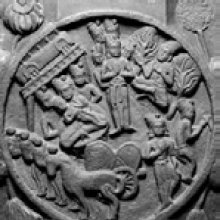Muka, Mūka, Mūka: 25 definitions
Introduction:
Muka means something in Buddhism, Pali, Hinduism, Sanskrit, Jainism, Prakrit, Marathi, Hindi, Tamil. If you want to know the exact meaning, history, etymology or English translation of this term then check out the descriptions on this page. Add your comment or reference to a book if you want to contribute to this summary article.
Muka has 24 English definitions available.
Alternative spellings of this word include Mook.
Images (photo gallery)
Languages of India and abroad
Sanskrit dictionary
[Deutsch Wörterbuch]
Source: Cologne Digital Sanskrit Dictionaries: Böhtlingk and Roth Grosses Petersburger WörterbuchMūka (मूक):—(von 1. mū; mūka [UJJVAL.] zu [Uṇādisūtra 3, 41])
1) adj. f. ā a) stumm [Amarakoṣa 3, 1, 13.] [Hemacandra’s Abhidhānacintāmaṇi 349.] [Anekārthasaṃgraha 2, 14.] [Medinīkoṣa k. 30.] [Halāyudha 2, 454.] [Vājasaneyisaṃhitā 30, 19.] [The Śatapathabrāhmaṇa 1, 4, 3, 15. 11, 5, 4, 13.] [Kauṣītakyupaniṣad 3, 3.] [Manu’s Gesetzbuch 7, 149. 9, 201. 11, 52.] [Mahābhārata 2, 259.] [Rāmāyaṇa Gorresio 2, 48, 13.] [Suśruta 1, 89, 11. 319, 14.] [KĀM. NĪTIS. 12, 42.] [Spr. 2257.] paraguṇe [3447.] [Varāhamihira’s Bṛhajjātaka 20, 4.] [DAŚAR. 2, 42.] [Kathāsaritsāgara 7, 66.] [Mārkāṇḍeyapurāṇa 71, 21. 72, 22.] [Weber’s Verzeichniss 289, 2.] viṣāda [Gītagovinda 7, 12.] praśna [Oxforder Handschriften 334,b,12.] mūkāṇḍaja (kānana) [Kumārasaṃbhava 3, 42.] abdāḥ [Varāhamihira’s Bṛhajjātaka S. 24, 21.] niśi stimitamūkāyām [Harivaṃśa 4130. 15230.] mūkavat [Spr. 553.] [Mahābhārata 3, 1389.] Vgl. maukya . — b) in einem kläglichen Zustande sich befindend (dīna) [Hemacandra’s Anekārthasaṃgraha] [UJJVAL.] —
2) m. a) Fisch [Trikāṇḍaśeṣa 1, 2, 15.] [Hemacandra’s Abhidhānacintāmaṇi 195.] — b) Nomen proprium α) eines Dānava [Hemacandra’s Anekārthasaṃgraha] [Medinīkoṣa] (lies daitya st. dainya) . [Mahābhārata 3, 1557.] [Viṣṇupurāṇa 147,] [Nalopākhyāna 1.] — β) eines Schlangendämons [Mahābhārata 1, 2150.] — Vgl. aneḍa (blind [Halāyudha 2, 454]), ṛṣya, eḍa, kalla taubstumm ( [Halāyudha]), mauka, maukya .
Source: Cologne Digital Sanskrit Dictionaries: Sanskrit-Wörterbuch in kürzerer FassungMukā (मुका):—f. Nomen proprium einer Stadt [Wilson's Uebersetzung des Viṣṇupurāṇa 2,165.]
--- OR ---
Mūka (मूक):—[Śatapathabrāhmaṇa 1,4,2,15.]) —
1) Adj. f. ā stumm (sowohl nicht sprechen könnend , keinen Laut von sich zu geben vermögend , als auch momentan schweigend , keinen Laut von sich gebend , lautlos überh.) b. * in einem kläglichen Zustande sich befindend. —
2) m. — a) Fisch. — b) Nomen proprium — α) eines Dānava. — β) eines Schlangendämons. — γ) eines Dichter [Private libraries (Gustav) 1,] No. 596. Auch kavi (1308. 6638. 6773.
6980) und mahākavi (2250).
Sanskrit, also spelled संस्कृतम् (saṃskṛtam), is an ancient language of India commonly seen as the grandmother of the Indo-European language family (even English!). Closely allied with Prakrit and Pali, Sanskrit is more exhaustive in both grammar and terms and has the most extensive collection of literature in the world, greatly surpassing its sister-languages Greek and Latin.
See also (Relevant definitions)
Starts with (+308): Mu-kaipunal, Mu-kalvattam, Mu-kanappan, Mu-katpakavan, Muka Danda, Muka Dava, Muka foni, Muka velai, Muka-abhinaya, Muka-anaikal, Muka-calacitra, Muka-mayakari, Muka-mukampar, Muka-tiriyakkunati, Muka-vatacanni, Muka-vaykattai, Muka-vellaiparuntu, Mukaba, Mukabala, Mukabali.
Ends with (+83): Abhigamuka, Abhramukamuka, Adhijyakarmuka, Agamuka, Ajagavakarmuka, Amuka, Amukatamuka, Anagamuka, Anapakramuka, Anedamuka, Anelamuka, Anugamuka, Apakramuka, Aremuka, Asankamuka, Atikamuka, Atteshukarmuka, Bhamuka, Bhimakarmuka, Cimuka.
Full-text (+306): Rishyamuka, Mukka, Edamuka, Maukya, Mauka, Anedamuka, Mukata, Mukabhava, Mukandaja, Mukambika, Mukapancashati, Muga, Mukakavi, Mukaprashna, Mukatva, Mukavat, Kalamuka, Jadamuka, Cukamuki, Anelamuka.
Relevant text
Search found 25 books and stories containing Muka, Moogaa, Muga, Mūka, Mūka, Mukā, Mūkā; (plurals include: Mukas, Moogaas, Mugas, Mūkas, Mukās, Mūkās). You can also click to the full overview containing English textual excerpts. Below are direct links for the most relevant articles:
Rudra-Shiva concept (Study) (by Maumita Bhattacharjee)
34. Kirāta incarnation of Śiva < [Chapter 5 - Rudra-Śiva in the Purāṇic Literature]
The Shiva Purana (by J. L. Shastri)
Chapter 39 - The demon Mūka is killed in the context of the incarnation of Kirāta < [Section 3 - Śatarudra-saṃhitā]
Chapter 37 - Instruction of Vyāsa in the context of Siva’s incarnation as Kirāta < [Section 3 - Śatarudra-saṃhitā]
The Padma Purana (by N.A. Deshpande)
Chapter 50 - The Account of the Five < [Section 1 - Sṛṣṭi-khaṇḍa (section on creation)]
Chapter 56 - The Account of the Five (conclusion) < [Section 1 - Sṛṣṭi-khaṇḍa (section on creation)]
List of Mahabharata people and places (by Laxman Burdak)
Manusmriti with the Commentary of Medhatithi (by Ganganatha Jha)
Verse 9.201 < [Section XXVI - Disqualifications to Inheritance]
